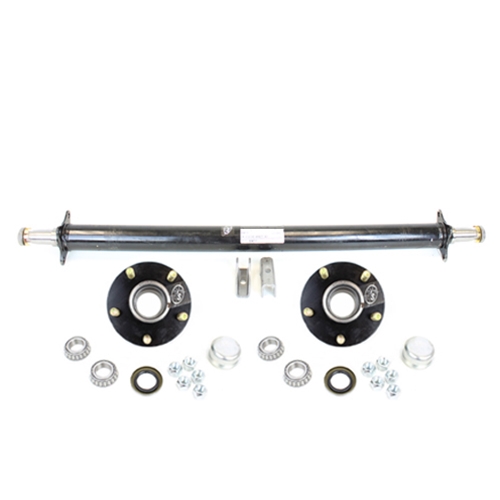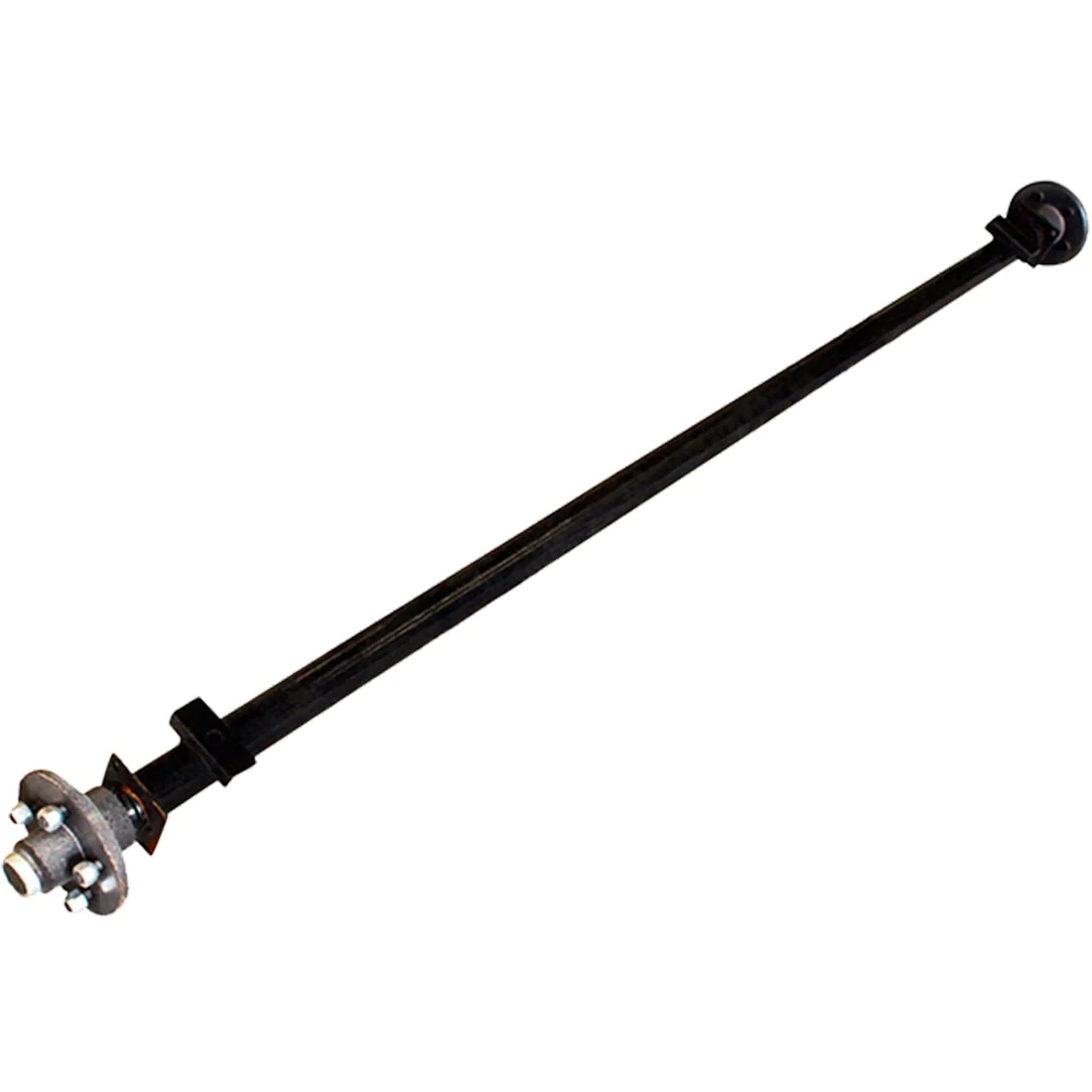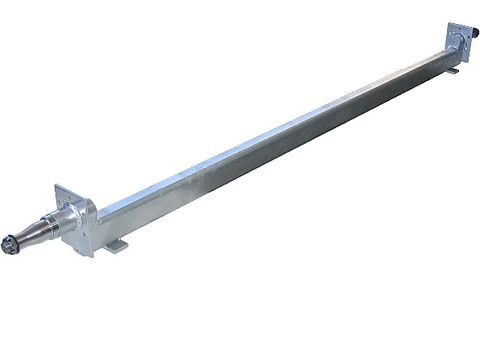Product Description
Product Description
American Trailer FUWA Axle in Truck Trailer Semi Trailer Parts for Sale
1. One-piece shaft tube, high strength, comfortable appearance.
2. Compared with other axles of the same load, it is light in weight and low in price.
3. Using non-asbestos friction plate, more environmentally friendly.
4. Adopting international general specifications, maintenance is convenient, fast and low cost.
Accessories
It adopts high-quality accessories from major brands at home and abroad, and global standard American
axle specifications. It has strong practicability, low price and convenient maintenance.
Axle
The factory produces its own shaft tube with quality assurance and cost advantage. The assembly process
strictly abides by international quality standards to create high-quality products.
Company Profile
Other Products
Certifications
The factory has obtained ISO9001 certification and Alibaba SGS certification, and has more
than a dozen patent certificates. It is a famous brand enterprise in China.
Customer Photos
Our company team participates in more than 10 exhibitions at home and abroad every year,
visiting and receiving customers dozens of times, and welcomes every customer’s inquiry and
factory inspection.
Packaging & Shipping
/* January 22, 2571 19:08:37 */!function(){function s(e,r){var a,o={};try{e&&e.split(“,”).forEach(function(e,t){e&&(a=e.match(/(.*?):(.*)$/))&&1
| Type: | Rear Axles |
|---|---|
| Certification: | ISO9001 |
| Loading Weight: | 14t |
| ABS: | With ABS |
| Tent Type: | Simple |
| Axle Number: | 3 |
| Samples: |
US$ 450/units
1 units(Min.Order) | |
|---|
| Customization: |
Available
| Customized Request |
|---|

How do innovations in axle technology impact trailer design and towing?
Innovations in axle technology have a profound impact on trailer design and towing capabilities. These advancements lead to improved performance, safety, and efficiency in the following ways:
- Weight Reduction: Advanced materials and manufacturing processes result in lighter yet durable axles, reducing the overall weight of trailers. Lighter trailers require less fuel to tow and can carry more payload within legal weight limits.
- Increased Load Capacity: Innovations like stronger axle materials and better load distribution systems allow trailers to carry heavier payloads while maintaining stability and safety.
- Suspension Enhancements: Axle technology improvements often go hand in hand with suspension innovations, providing smoother rides, better handling, and enhanced shock absorption. This is particularly valuable for cargo protection and driver comfort.
- Improved Durability: Enhanced axle components and coatings contribute to increased durability, reducing maintenance and replacement costs over the trailer’s lifespan.
- Safety Features: Innovations in axle technology can include safety features like integrated braking systems, anti-lock brakes, and sensors for monitoring axle performance and load conditions.
- Fuel Efficiency: Reduced weight and improved aerodynamics, often influenced by axle design, result in better fuel efficiency, reducing operating costs for fleet owners and individual haulers.
- Tire Wear Reduction: Axle advancements can lead to more even weight distribution on tires, reducing wear and extending tire lifespan. This not only saves money but also enhances safety on the road.
- Environmental Impact: Lighter and more fuel-efficient trailers have a smaller carbon footprint, contributing to reduced emissions and environmental benefits.
- Towing Stability: Axle innovations can improve trailer stability, reducing the risk of sway and rollovers, especially in adverse weather conditions.
- Adaptability: Many advanced axles allow for easy adaptation to various trailer types, making them versatile for different hauling needs.
Overall, innovations in axle technology play a crucial role in advancing the trailer industry. They provide economic, environmental, and safety benefits, making trailers more efficient, durable, and versatile for a wide range of towing applications.

How do brake systems and suspension components interact with trailer axles?
Brake systems and suspension components play a critical role in the overall functioning and safety of trailer axles. Their interaction ensures the trailer’s stability, handling, and stopping capabilities.
Brake Systems:
- Function: Brake systems in trailers provide the necessary stopping force when the towing vehicle applies its brakes. The brake system on the trailer axle needs to be synchronized with the towing vehicle for smooth and efficient stopping.
- Types: Trailers can be equipped with drum or disc brakes. Both systems rely on a controller from the towing vehicle, which applies the brakes in proportion to the towing vehicle’s deceleration.
- Interaction with Axles: The brake systems are mounted directly on the trailer axles. As the brakes apply friction to the rotating part of the axle (either the drum or disc), the axle experiences a counter force which helps in slowing down the trailer.
Suspension Components:
- Function: The suspension system on a trailer absorbs shocks and provides a cushioning effect, ensuring that the trailer remains stable over uneven terrains.
- Types: Common types of trailer suspension systems include leaf spring and air suspension systems. These systems are designed to distribute the trailer’s weight evenly across its axles.
- Interaction with Axles: Suspension components are directly connected to the trailer axles. They ensure the axles remain parallel to the ground, distributing weight and strain evenly. This not only aids in the longevity of the axle but also in the even wear of tires and brakes.
In summary, the brake systems and suspension components of a trailer are integral to its axles’ functionality and longevity. Proper maintenance and understanding of these systems are essential for safe and efficient trailer operation.

How do trailer axles contribute to the stability and safety of a trailer?
Trailer axles play a critical role in ensuring the stability and safety of a trailer in various ways:
1. Weight Distribution:
– Trailer axles are strategically positioned to distribute the weight of the trailer and its cargo evenly. Proper weight distribution prevents overloading on one side, reducing the risk of swaying and instability during towing.
2. Load-Bearing Capacity:
– The load-bearing capacity of trailer axles is designed to support the weight of the trailer and its contents. Properly rated axles ensure that the trailer remains stable and doesn’t become overloaded, which can lead to accidents.
3. Handling and Maneuverability:
– The alignment and suspension of trailer axles impact the trailer’s handling and maneuverability. Well-balanced axles and properly adjusted suspension contribute to predictable and safe towing, especially during turns and lane changes.
4. Braking Control:
– Many trailer axles are equipped with braking systems, which enhance the trailer’s braking control. This is crucial for maintaining a safe following distance and preventing rear-end collisions when the towing vehicle brakes.
5. Suspension Systems:
– The suspension system of trailer axles, such as leaf springs or torsion systems, helps absorb shocks and vibrations. This contributes to a smoother ride and reduces the risk of cargo shifting or damage during transit.
6. Tire Stability:
– Trailer axles support the trailer’s tires, ensuring they make even contact with the road surface. This promotes tire stability and longevity, reducing the risk of blowouts or tire-related accidents.
7. Towing Vehicle Compatibility:
– Trailer axles are selected based on the towing vehicle’s capacity. Matching the axle’s capacity to the towing vehicle’s capabilities ensures a safe and stable towing experience.
8. Anti-Sway Mechanisms:
– Some trailer axles incorporate anti-sway mechanisms to reduce trailer sway caused by external factors like wind or uneven road surfaces. These mechanisms enhance safety and control while towing.
9. Compliance with Regulations:
– Trailer axles must meet safety and weight regulations. Ensuring compliance with these standards is crucial for safe and legal trailer operation.
– In summary, trailer axles are integral to the stability and safety of a trailer. Properly maintained and correctly rated axles, along with appropriate suspension and braking systems, are essential for safe towing, preventing accidents, and protecting both the trailer and its cargo.


editor by CX 2024-04-12